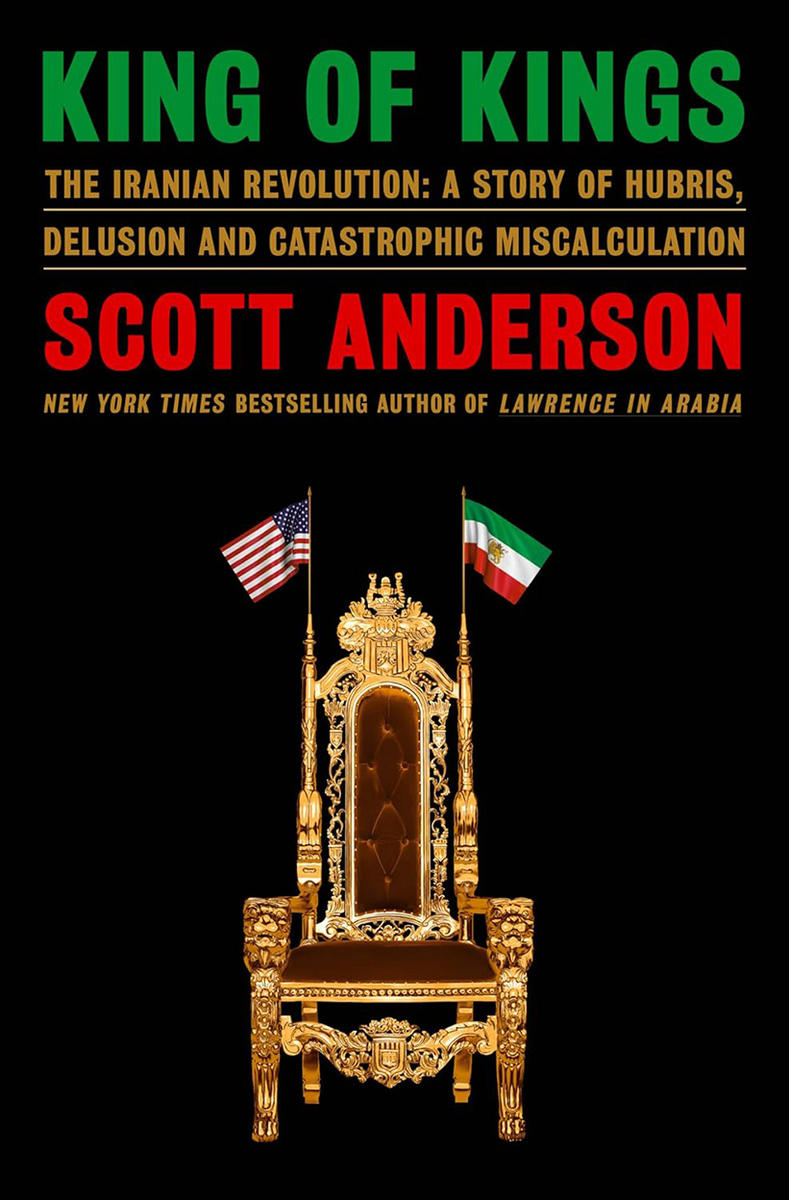Iran’s Revolution and Foreign Service Heroes: A Review Essay
A new book on U.S.-Iran relations and the Iranian Revolution spotlights the outstanding work of career diplomats.
BY JOHN LIMBERT

Events in Iran almost never make for cheery reading, especially when the story includes the U.S. government. Scott Anderson’s new book, King of Kings, on the Iranian Revolution and U.S.-Iranian relations during the 1970s, tells another sad story that does little credit to its many actors, both American and Iranian.
As the title says, this is a story of “hubris, delusion, and catastrophic miscalculations.” Just one such was President Jimmy Carter’s disastrous decision to admit the ailing Shah of Iran to the United States and the subsequent occupation of the U.S. embassy, which cost Carter his presidency and pushed Iran’s revolution on the road to brutal theocracy.
A fresh and well-researched look at the Iranian Revolution—an event that changed the world’s geopolitical equations dramatically and in ways we still grapple with today—is certainly welcome. For King of Kings, Anderson relied largely on extensive interviews with a limited number of participants (members of the shah’s family and court, Iranian political figures, and U.S. diplomats) and other original sources.
As he says in the preface: “It is my hope that by focusing on the actions and experiences of that small cast of people who resided in or were eyewitness to the inner circles of the revolution, I might both tell a new version of an old tale and begin to answer some of the riddles of why the Iranian Revolution played out as it did.” Arguably, he succeeds in this.
But this book has, in my view, another very important dimension: Anderson’s account shines light on individual Foreign Service officers on the front lines in the Iran crisis who, when placed in an impossible situation, responded as their oaths of office demanded—with honor, insight, and courage.
In documenting these diplomats’ professionalism, dedication, and honesty, his book is a highly readable antidote to the current wave of ignorance that has told thousands of devoted public servants that they and their decades of service no longer matter.
FSOs on the Ground in Iran
Anderson’s most important story is not about famous people who write memoirs that end up on the 50-cent remainder table after two weeks. His story is of Foreign Service colleagues who never sought fame: brave and honorable public servants, including Bruce Laingen, America’s last chief of mission in Tehran; Michael Metrinko, consul general in Tabriz and political officer at the embassy in Tehran; Henry Precht, country director for Iranian affairs; and William Sullivan, last U.S. ambassador to Iran.
Despite threats to their careers and their lives, they insisted on providing the most accurate information and the best advice possible from the field to decision-makers in Washington without regard to partisan politics or the winds of political fashion.
They were not always right. Who is? Both the clueless and the well-informed, including this essay writer, got many things wrong. In October 1979, for example, we all missed “the big one” and failed to evacuate our Tehran mission after President Carter, ignoring his own forebodings, admitted the shah to the U.S. Like almost everyone dealing with Iran in those days, we overestimated the strength of the monarchy, underestimated the power and depth of discontent in Iranian society, misread the goals of Ayatollah Khomeini and his allies, and relied on well-intentioned Iranian nationalists who in 1979 were (powerless) officials in Iran’s provisional government.
We had neither read nor understood Khomeini’s writings, such as Revealing Secrets (1942) and Islamic Government (1971), in which he condemned pluralism and democracy and outlined his blueprint for a theocratic dictatorship modeled on the imagined system of the Prophet Muhammad in seventh-century Medina. As a matter of fact, few middle-class Iranians, who marched (and voted) for an Islamic Republic in 1978-1979, had read Khomeini’s works or understood his obscurantist and reactionary program. In the words of the scholar Shaul Bakhash, “[These Iranians] loved the revolution not knowing it would not love them back.”
Being right was never the point (in the Foreign Service if we’re always right, we’re being too cautious); the point was to avoid wishful thinking and self-delusion. For too long, Americans were tightly bound to the shah. The 1953 American and British-backed coup that rescued the shah and toppled the nationalist Prime Minister Mohammad Mosaddeq ensured that the shah saw that his remaining in power depended more on the goodwill of foreigners than on the goodwill of Iranians. The Americans, having once saved the shah, were now, for better or worse, stuck with him, his system, his relatives, and his sycophants.
A few of our colleagues asked: “Is unconditional support for the shah the best policy for the U.S.?” And those who could sense the undercurrents of resentment among Iranians had the temerity to ask: “Is our unconditional support for this unpopular ruler going to haunt us eventually?” Their doubts, which few wanted to hear, did not make the questioners many friends.
A few of our colleagues asked: “Is unconditional support for the shah the best policy for the U.S.?”
When Metrinko, who took his responsibilities seriously, reported a threatened mass resignation of Iranian Air Force pilots in Tabriz in October 1978, an outraged ambassador threatened to end the young officer’s career. As Anderson writes (page 321): “In short order Michael Metrinko was ordered to Tehran, where he was once again brought before a furious William Sullivan. ‘He told me that if I ever repeated a story like that again,’ Metrinko said, ‘causing panic and whatnot, he’d have me thrown out of the Foreign Service.’”
To his credit, as the wave of opposition grew in the fall of 1978, Sullivan came to recognize that the Pahlavi monarchy was finished and that Washington should start (in his words) “thinking the unthinkable.” The message was not welcome, and reaction in Washington to Sullivan’s reporting was about the same as his own initial reaction to Metrinko’s bad news. Carter considered recalling Sullivan, and as the shah’s government collapsed in January-February 1979, national security adviser Zbigniew Brzezinski, living in a fantasy world, ordered Sullivan to stage a coup.
Knowing that the Iranian military no longer answered to the shah’s generals, Sullivan responded with an obscenity and set about protecting his people when the embassy came under armed attack three days after the revolution. Leaving Iran in April 1979, Sullivan found himself frozen out in Washington, where his colleagues sensed damaged goods. His Foreign Service career was over.
The Game Went On
After royal authority collapsed in Tehran on February 11, 1979, Tabriz, Iran’s second city, was in chaos, and Consul Metrinko—seeking to protect a group of Americans held in the local prison—was captured, threatened with lynching, released, recaptured, and threatened with a trial, until he and his chargés were sent to Tehran on February 18. He remained in the capital as political officer, doing excellent reporting until the final collapse in November.
In a bizarre postscript straight from Kafka, in October 1979, while Metrinko was on leave in Washington, the State Department arranged for him to meet senior officials to discuss his insightful reporting on deteriorating conditions in Iran.
As Anderson describes the scene (page 391): “Arriving at the conference room a few minutes early, Metrinko was going over his notes for his presentation when a departmental security officer approached to ask if they could speak in the hallway. There, the security officer explained that the meeting had been given a security classification higher than Metrinko had clearance to attend. Metrinko politely inquired if the officer understood that the reason for the meeting was to discuss his reporting. ‘Yeah,’ came the reply. ‘Doesn’t matter.’”
You can’t make this stuff up. The farce continued even while colleagues were reporting what they were seeing and hearing. In July 1979, Chief of Mission Bruce Laingen told Secretary of State Cyrus Vance in the clearest and most polite language that although the U.S. might want to admit the shah to the United States at some future date, to do so under present conditions would have three outcomes: (1) Bazargan’s moderate provisional government—already besieged by extremists of left and right—would collapse; (2) any chance of restoring some sort of U.S.-Iran relationship would disappear; and (3) the U.S. embassy could no longer operate in Tehran.
So, what did the president and his advisers do three months after receiving this unambiguous message? They admitted the shah, creating a story about his illness that, even if true, no Iranian was going to believe; left Laingen, Metrinko, and their colleagues in Tehran to face the consequences; and appeared surprised and unprepared when their house of cards collapsed on November 4.
Ignorance and Honor
Scholars still argue about the events of the Iranian Revolution and its brutal aftermath. In simple terms, who can explain the continued existence of an Iranian theocracy in the 21st century?
Those in power under the monarchy blame everyone but themselves and have made President Carter the revolution’s chief engineer. Just months before his July 1980 death in Cairo, when confined to a hospital bed in New York, the deposed shah received Ambassador Richard Helms and his wife, Cynthia, for a visit. According to Cynthia’s memoir, An Ambassador’s Wife in Iran (1981), the shah bitterly and insistently pressed Ambassador Helms to tell him why the Americans decided to get rid of the monarchy and replace it with the rule of a 75-year-old seminarian.
Attuned to the apparent haphazardness of the Iranian Revolution, Anderson’s fascinating narrative is full of “Oh no!” and “might have been.”
In King of Kings, Anderson puts aside grand strategy and conspiracy theories. He has provided us instead with the well-written account of a highly skilled journalist and novelist. The author of two novels and five works of nonfiction, including the well-received Lawrence in Arabia (2013), he worked as a war correspondent from 1983 to 2011, covering the Lebanese Civil War, Northern Ireland, Bosnia, the Israeli-Palestinian conflict, Darfur, and Libya.
Anderson brings wit and insight to his writing, which emphasizes the human element in historical narratives, focusing on individuals caught up in the sweep of larger conflicts or political crises.
Attuned to the apparent haphazardness of the Iranian Revolution, Anderson has written a fascinating narrative full of “oh no!” and “might have been.” Everyone, including the revolutionaries, was groping; everyone was improvising. They were not playing chess—where everything is seen and planned—but backgammon, a game Iranians invented and still adore. In backgammon, like politics, a player improvises, reacts, and cannot plan more than one or two moves ahead. Chance plays a vital role, and a fortunate or unfortunate roll of the dice will upend the entire game.
Coda
In 2005, as president of the American Foreign Service Association, I met with a staffer from the office of the Senate majority leader to seek the leader’s all-important support for legislation benefiting the Foreign Service. After listening to my presentation, the staffer said, “That’s all well and good, but many here believe that you FSOs have a very cushy life.” It was difficult to stay polite, but I could say only: “A cushy life!? Have you seen my career? Guinea. Iran. Mauritania. Sudan. Iraq. Where’s the cush?”
Although the Foreign Service has friends and supporters, we also have obstinate enemies who dislike us viscerally for who we are. With such enemies there’s no arguing, no reasoning, and no convincing. One of their carps (among many) is that we take our oath of office seriously and—whatever our personal opinions—carry out the policies of the administration in service to the American people. We serve presidents and Secretaries of both parties and are responsible for providing the most accurate information and best advice possible.
Lacking jets, tanks, and warships to “persuade,” our tools are measured words, listening, empathy, and patience. We talk to the rascals and scoundrels who occupy thrones and palaces around the world. Our values and ethos, however, have not always endeared us to those pseudo-machos seeking to look tough, discredit a predecessor, and silence dissent. And in today’s political bear pit, public servants—both Civil Service and Foreign Service—have become a particular target.
Readers may not always agree with Scott Anderson’s analysis, but in King of Kings, he tells a riveting story that features ignorance and greed among many, and honor, sacrifice, and insight among a few. His account of U.S.-Iran relations and the part played by these brave Foreign Service officers—whose values, to borrow a phrase from the U.S. Navy, were “Duty, Honor, Country”—reminds us of the critical work this small group of patriotic Americans does on behalf of the rest of us.
The tragedy is that no one listened then; and now these honorable public servants are not only ignored but openly despised and ridiculed.
When sharing or linking to FSJ articles online, which we welcome and encourage, please be sure to cite the magazine (The Foreign Service Journal) and the month and year of publication. Please check the permissions page for further details.
Read More...
- “The 1979 Hostage Crisis: Down and Out in Tehran” by Michael Metrinko, Grossman, The Foreign Service Journal, March 2015
- “A Lingering Poison—Tehran, 40 Years Later: What Have We Learned?” by John Limbert, The Foreign Service Journal, November 2019
- “Believers: Love and Death in Tehran—An Excerpt” by John Limbert and Marc Grossman, The Foreign Service Journal, January-February 2021





